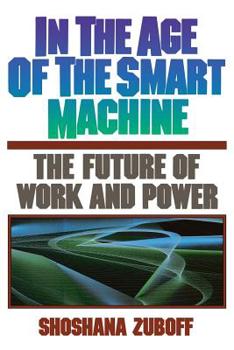In the Age of the Smart Machine: The Future of Work and Power
Select Format
Select Condition 
Book Overview
A noted Harvard social scientist documents the pitfalls and promises of computerized technology in business life.
Format:Paperback
Language:English
ISBN:0465032117
ISBN13:9780465032112
Release Date:October 1989
Publisher:Basic Books
Length:468 Pages
Weight:1.56 lbs.
Dimensions:1.4" x 6.1" x 9.3"
Customer Reviews
5 ratings
A seminal book
Published by Thriftbooks.com User , 15 years ago
System engineers and business process people will find a wealth of insights and case studies on how to make systems humane and usable. This is a must read. It explains how poor design can cause users to "fudge" their input to make them look good and explains the effects of human dissatisfaction as a result of poor systems design.
14 years and still looking good
Published by Thriftbooks.com User , 22 years ago
I re-read this book again this year (2002) after a decade of its first publication in 1988, it still looks amazingly current, especially consider internet's wide adoption since 1995.It was as though the smart machines and their relationships with human workplace has not changed since 1988. Even in silicon valley where I work, with so many tech companies with managers trained in technology background, their orgazniations keeps failing by repeating the single-minded strategy - replace human with technology.As long as corporate America keep ignoring the main advice of t this book - that to fully utilize technology you have to understand the non-technical aspects of it (historical, psychological, social) - real productivity gain might be limited, until maybe we move everything to Bangalore, India.
Zuboff explains congnative styles and computers
Published by Thriftbooks.com User , 26 years ago
I first read this book back in 1989 when I was working for NeXT computer, and it has remained in my mind as a landmark book. I heard a presentation from a person from Allegeny college that referenced this book. He was discussing the fact that when people are given different tools they solve problems in different ways. If all you have is DOS you abiltiy to solve information problems will be based on what you can do with DOS. But if you had a NeXT... Since reading this book I have tried to apply these concepts to my teaching object-oriented programming and high reuse problem solving techniques. This book really helped me understand that using advanced computers is a lot more then just teaching people a different windowing system. It is about getting them to rethink they WAY they solve thier problems using the cognative styles enabled by advanced software systems. Tim Berners-Lee could never have drempt of the web from a DOS system. But from a NeXT...
An historically informed interdisciplinary account of work.
Published by Thriftbooks.com User , 26 years ago
I use this text in a course called "Work and Community" because it shows how various disciplines--history, philosophy, sociology, cognitive psychology --can inform discussions about how work is organized, and the kinds of power or authority relationships that workplaces, especially those where computers have changed the nature of work, abound. What's particularly interesting for me is the way Zuboff hits on the sort of literacy encouraged by computerized workplaces, and how information sharing requires real re-thinking of traditional roles of managers. In addition, the historical treatment of management as a developing professional competence would be critically enlightening for those who tend to study "business" as if it were merely a skill to acquire, rather than something with a history to be understood.
Lead with the subtitle "The Future of Work and Power...."
Published by Thriftbooks.com User , 27 years ago
Zuboff's book should have been titled "The Future of Work and Power in the Age of the Smart Machine," because while the book does speak to the increasing computerization of the workplace, it does so in an historical context regarding how power has been and might be distributed between worker and manager. Automation is the effort to remove human skill from work, making humans the servants of the "smart machine." Informating is the way in which the computer can potentially change the workplace by distributing "management information" and power to the workers, making them co-equal partners in the enterprise. Zuboff suggests we still have a choice about which way to go, despite our self-protective impulses





